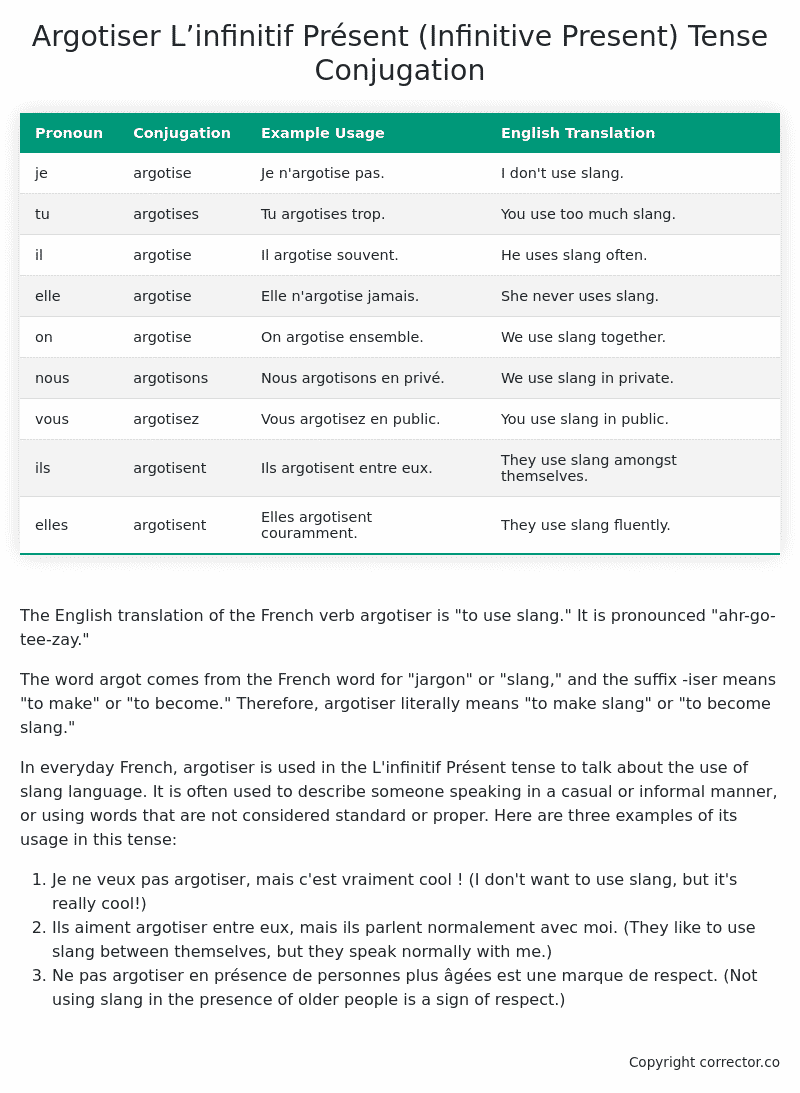L’infinitif Présent (Infinitive Present) Tense Conjugation of the French Verb argotiser
Introduction to the verb argotiser
The English translation of the French verb argotiser is “to use slang.” It is pronounced “ahr-go-tee-zay.”
The word argot comes from the French word for “jargon” or “slang,” and the suffix -iser means “to make” or “to become.” Therefore, argotiser literally means “to make slang” or “to become slang.”
In everyday French, argotiser is used in the L’infinitif Présent tense to talk about the use of slang language. It is often used to describe someone speaking in a casual or informal manner, or using words that are not considered standard or proper. Here are three examples of its usage in this tense:
- Je ne veux pas argotiser, mais c’est vraiment cool ! (I don’t want to use slang, but it’s really cool!)
- Ils aiment argotiser entre eux, mais ils parlent normalement avec moi. (They like to use slang between themselves, but they speak normally with me.)
- Ne pas argotiser en présence de personnes plus âgées est une marque de respect. (Not using slang in the presence of older people is a sign of respect.)
Table of the L’infinitif Présent (Infinitive Present) Tense Conjugation of argotiser
| Pronoun | Conjugation | Example Usage | English Translation |
|---|---|---|---|
| je | argotise | Je n’argotise pas. | I don’t use slang. |
| tu | argotises | Tu argotises trop. | You use too much slang. |
| il | argotise | Il argotise souvent. | He uses slang often. |
| elle | argotise | Elle n’argotise jamais. | She never uses slang. |
| on | argotise | On argotise ensemble. | We use slang together. |
| nous | argotisons | Nous argotisons en privé. | We use slang in private. |
| vous | argotisez | Vous argotisez en public. | You use slang in public. |
| ils | argotisent | Ils argotisent entre eux. | They use slang amongst themselves. |
| elles | argotisent | Elles argotisent couramment. | They use slang fluently. |
Other Conjugations for Argotiser.
Le Present (Present Tense) Conjugation of the French Verb argotiser
Imparfait (Imperfect) Tense Conjugation of the French Verb argotiser
Passé Simple (Simple Past) Tense Conjugation of the French Verb argotiser
Passé Composé (Present Perfect) Tense Conjugation of the French Verb argotiser
Futur Simple (Simple Future) Tense Conjugation of the French Verb argotiser
Futur Proche (Near Future) Tense Conjugation of the French Verb argotiser
Plus-que-parfait (Pluperfect) Tense Conjugation of the French Verb argotiser
Passé Antérieur (Past Anterior) Tense Conjugation of the French Verb argotiser
Futur Antérieur (Future Anterior) Tense Conjugation of the French Verb argotiser
Subjonctif Présent (Subjunctive Present) Tense Conjugation of the French Verb argotiser
Subjonctif Passé (Subjunctive Past) Tense Conjugation of the French Verb argotiser
Subjonctif Imparfait (Subjunctive Imperfect) Tense Conjugation of the French Verb argotiser
Subjonctif Plus-que-parfait (Subjunctive Pluperfect) Tense Conjugation of the French Verb argotiser
Conditionnel Présent (Conditional Present) Tense Conjugation of the French Verb argotiser
Conditionnel Passé (Conditional Past) Tense Conjugation of the French Verb argotiser
L’impératif Présent (Imperative Present) Tense Conjugation of the French Verb argotiser
L’infinitif Présent (Infinitive Present) Tense Conjugation of the French Verb argotiser (this article)
Struggling with French verbs or the language in general? Why not use our free French Grammar Checker – no registration required!
Get a FREE Download Study Sheet of this Conjugation 🔥
Simply right click the image below, click “save image” and get your free reference for the argotiser L’infinitif Présent tense conjugation!

Argotiser – About the French L’infinitif Présent (Infinitive Present) Tense
Forming the Infinitive Present
Common Everyday Usage Patterns
As a Verb’s Dictionary Form
After Modal Verbs
As an Imperative
In Infinitive Clauses
Interactions with Other Tenses
Present Tense
Future Tense
Conditional Tense
Passé Composé
Imperfect Tense
Subjunctive and Conditional Moods
Summary
Want More?
I hope you enjoyed this article on the verb argotiser. Still in a learning mood? Check out another TOTALLY random French verb conjugation!


